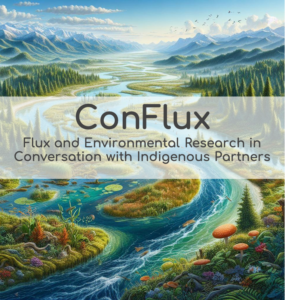 We are excited to announce a new webinar series for the Flux community! The name ‘ConFlux’ was chosen because it describes the junction of two rivers (more often called confluence), and because it sounds flux-y!
We are excited to announce a new webinar series for the Flux community! The name ‘ConFlux’ was chosen because it describes the junction of two rivers (more often called confluence), and because it sounds flux-y!
We are lining up a number of speakers in flux, environmental and ecological research for this Summer and Fall. Several speakers with indigenous backgrounds will share their perspective, and other speakers will outline research partnerships with with indigenous collaborators. Our aim for this webinar series is to provide opportunities to learn about indigenous presence in research, and about relationships between field based research teams, such as flux towers and indigenous people.
First ConFlux Webinar: “Environmental Justice for Environmental Science”
Ryan Emanuel, Duke University
July 22, 1PM Eastern/10AM Pacific – Register here
Abstract: Earth and environmental scientists sometimes think about our research as supporting efforts to promote environmental justice (i.e., environmental science for environmental justice). This framing is often true and can yield impactful science, but scientists can also benefit from flipping their perspective to consider how concepts and principles of environmental justice might sharpen our work as researchers (i.e., environmental justice for environmental science). This talk focuses on the idea that scientific research can be informed, strengthened, and even transformed through meaningful integration of environmental justice concepts, principles, and practices. I discuss these ideas using examples of long-term partnerships with Indigenous communities in North Carolina. These partnerships aim to identify and address the impacts of industrial livestock production, fossil fuel infrastructure, and climate change on culturally significant landscapes and waterways. Stories, examples, and other insights are drawn primarily from my new book, On the Swamp: Fighting for Indigenous Environmental Justice.
Ryan Emanuel studies ecohydrology, biogeosciences, environmental justice, and Indigenous rights, and aims to amplify voices of Indigenous and other marginalized communities who shoulder disproportionate environmental burdens. He is the author of On the Swamp – Fighting for Indigenous Environmental Justice
Second ConFlux Webinar: “Considerations for Tribal Engagement”
Angela Waupochick, University of Wisconsin – Madison
August 19, 1PM Eastern/10AM Pacific – Register here
Angela Waupochick studies black ash conservation in forest wetlands in the Menominee and Stockbridge-Munsee Tribal Lands.

No Comments
Be the first to start a conversation